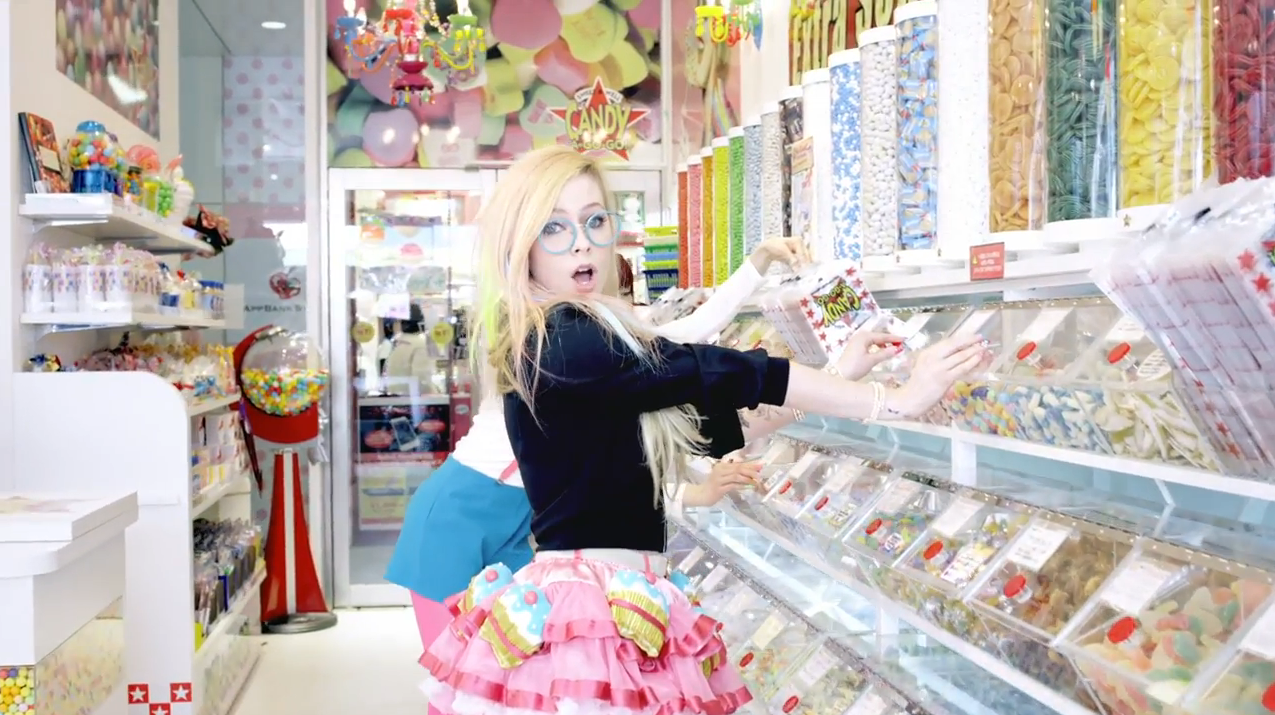We spent a weekend listening to only Avril Lavigne albums to figure out where it all went wrong
by Ryan McNutt
April 28, 2014
It’s hardly surprising when a pop star becomes a punchline. A life in the public eye is challenging at the best of times, let alone in a digital age when scorn and mockery are easy tactics to cope with mass culture’s persistent attempts to tell us what to buy/consume/listen to. Some pop stars manage to rebound from the jokes; others get buried under them.
The punchlines have been chasing Avril Lavigne for some time now. They’re inevitable when you suddenly announce your engagement to probably the most readily mocked individual in Canadian music, and her declining sales and staid rebellion image haven’t helped matters. But it took a particularly dreadful single and a dose of cultural appropriation for the punchlines to coalesce into a full-blown TKO last week.

“Hello Kitty” is easily the nadir of Avril Lavigne’s career: musically, visually, existentially. Much of the conversation since the video’s release has been about whether or not the Japan-centric clip is racist. Lavigne’s response to the accusations was characteristically juvenile (“RACIST??? LOLOLOL!!!”) and predictably tin-eared: the fact that it was made with a Japanese director, choreographer, and label, or that Lavigne spends half her time these days in Japan, doesn’t make the video’s portrayal of Japanese culture any more appropriate, or any less uncomfortable to watch. One would think that 10 years on from Gwen Stefani’s controversial “Harajuku Girls” video, artists and labels alike would have gained some perspective on how problematic these sorts of shallow, culture-raiding gimmicks are. Clearly, we still have a ways to go.
But even if you’re on-side with Lavigne on the racism question, the song and video are still a mess: flashy colours, crude double-entendres, and trend-hopping bass drops splattered aimlessly with only the slightest of cares. Lavigne seems to be sleepwalking through the video, her dance moves barely counting as moves, her lipsyncing atrociously executed. It’s a sad, empty performance of a dreadful song.
The “pop star as empty vessel” is hardly a novel trope, and a notably gendered one as well: we continue to ascribe agency to men when they release personality-barren pop songs (see Enrique Iglesias’ latest series of frat party anthems, as an example) but readily note its absence when it’s male producers writing for female vocalists (take most criticism of Britney Spears from the past decade). To some degree, Lavigne’s musical agency has always been in question, given how much attention has been paid to her varied songwriting collaborators over the years and the perceived calculation of her “mall punk” image. But she’s managed to put together a 12-year career with dozens of hits — some of them downright inarguable — to become perhaps our country’s second-most successful musical export of the 2000s. (Her husband’s band, for better or worse, would be first on that list.)
That sort of sustained success is nothing to scoff at, so why are we so quick to scoff at Lavigne? If “Hello Kitty” is Lavigne’s rock-bottom, how did she end up here, in full-blown punchline mode? In the interest of cracking the case, I spent my entire weekend listening to Lavinge’s five-record discography, album-by-album, to see if they contain any answers to be found.
(Quick stats primer: a platinum record is a million units in the US and 100,000 in Canada; gold is 500,000 and 50,000, respectively.)
Let Go (2002)
Top chart position: Canada #1, US #2
Sales certifications: US 6x Platinum, Canada Diamond (10x Platinum)
Charting singles (US Hot 100): “Complicated” (#2), “Sk8er Boi” (#10), “I’m With You,” (#4) “Losing Grip” (#64)
“Complicated” is one of those omnipresent singles that’s woven itself so deep into the public consciousness, it’s probably been years since you actively listened to it. Revisiting the song, it’s remarkable how young Lavigne sounds. Over the years, she’s developed a noted drawl in the way she slurs her vowels, an affection every bit as recognizable and imitable as her now-husband’s gruff baritone. Here, you only hear the faintest hints of that distinctive voice, and the result is that even the album’s hits sound more generic than you might remember; they really only stand out in contrast to the radio-ready mush that surrounds them.
And yet, the entire template of Lavigne’s career can be found in those three massive, world-conquering singles. On “Sk8er Boi,” you have the brat: a punkish, devil-may-care attitude, but with a smirk sneaking through the sneer to let you know it’s not actually all that serious. On “I’m With You,” you have the balladeer: a fragile-but-determined voice, able to flip a switch and go from soft and broken to a full-blown belter in an instant. And on “Complicated,” those two personae meet in the middle and create a timeless, near-perfect teenage pop song in the process.
While I don’t want to risk robbing Lavigne of her own creative agency in the fashion noted in my intro, it’s really impossible to talk about her work without detailing her collaborators; nearly all of her creative twists and turns have been greatly influenced by the people she’s worked with. The architects behind Let Go‘s three megahits were a songwriting/production team known as The Matrix, and their success with Lavigne had everyone pegging them as the next big thing in pop music. Instead, not unlike the film franchise that shares their name, The Matrix turned out to be a one-trick pony and spent the next few years rewriting “Complicated” for artists like Lillix, Hillary Duff, and Liz Phair, with vastly diminishing returns. Had Avril continued to work with them, one suspects she would have suffered a similar fate, but she wisely went in a slightly different direction with her follow-up.
Under My Skin (2004)
Top chart position: #1 in Canada and US
Sales certifications: US 3x Platinum, Canada 5x Platinum
Charting singles (US Hot 100): “Don’t Tell Me,” (#22) “My Happy Ending,” (#9), “Nobody’s Home” (#41)
A commercial comedown from Let Go, none of the singles from Under My Skin had even a fraction of the cultural impact of those from Lavigne’s debut. And yet, I’d contend Under My Skin is probably the reason we’re still talking about Lavigne today.
It’s not easy to break out of the teen music ghetto. It’s the reason why One Direction are shamelessly ripping off classic rock riffs, and why Justin Bieber is flailing to try and connect with hip-hop culture: if teen idols don’t successfully cross over to a wider audience, their teenage worshippers grow up and move on. Lavigne was starting from a privileged position in this regard, given that her big singles were already crossovers. But with CanCon hitmakers Raine Maida and Chantal Kreviazuk by her side, Lavigne doubled down on some of the adult-contemporary flourishes that she teased on her debut and created a sound that helped her avoid becoming a one-album wonder (and a sound she’d rely on throughout her career).
The album’s best song is actually one that Maida and Kreviazuk didn’t touch: on “My Happy Ending,” Butch Walker is the helping hand. But the song fits in perfectly among the rest of the material. It brings the piano to the forefront (rather than the “strummy strummy la la” acoustic guitar that dominated Let Go), Lavigne’s vocal performance feels much more human than anything on her debut, and the big guitar chorus would sound perfectly at home on a Kelly Clarkson or Pink album. I wish the rest of the record were as solid; much of it is a slog. The only other real standout is “He Wasn’t,” Lavigne’s punkiest track to date and a harbinger of what was to come on her next record.
The Best Damn Thing (2007)
Top chart position: #1 in Canada and US
Sales certifications: US Platinum, Canada 2x Platinum
Charting singles (US Hot 100): “Girlfriend,” (#1) “When You’re Gone,” (#24) “Hot,” (#95) “Keep Holding On” (#17)
And so we come to “Girlfriend,” Lavigne’s first and only no. one hit on the Billboard Hot 100 and the pivot point of her career. From “Girlfriend” onwards, the tension between the brat and the ballader would become increasingly pendulum-like, with Lavigne oscillating between the two extremes like a reaction against herself. But, hey, when it results in a track as great as “Girlfriend,” who’s to argue?
“Girlfriend” calls back to so many storied musical traditions — girl groups, pop punk, the “call and response” anthem — that it feels timeless, even as its production places it decidedly in the mid-2000s. (Thank the king of modern Evil Pop himself, Dr. Luke, for that.) It’s instantly hummable, effortless breezy, and is arguably the best Lavigne has ever been at endearingly capturing a sense of defiance on record. (Also, in recording the song in seven different languages, its success helped Lavigne grow her global audience significantly.)
And yet, there was something off about “Girlfriend” too. It was the first time a certain feeling of the uncanny began to creep into Lavigne’s portrayal of age. She seemed, at once, a bit too old and a bit too young for the song: too old for it to be an expression of authentic experience, but too young for it to be nostalgic. Much of The Best Damn Thing, ballads aside, follows “Girlfriend’s” template, making the album decidedly more teenage in its sentiments than even her debut. On its own terms, it’s Lavigne’s best record by a good margin, with a hit-to-miss ratio that dwarfs the rest of her discography. But if Under My Skin was the sound of Lavigne entering adulthood, The Best Damn Thing sounded like her denial of it, a creative direction that brought short-term gains, but long-term consequences as well.
Goodbye Lullaby (2011)
Top chart position: Canada #2, US #4
Sales certifications: None
Charting singles (US Hot 100): “What the Hell” (11), “Smile” (68), “Wish You Were Here” (65)
“What the Hell” is probably the most underrated single in Lavigne’s discography: a deliriously catchy ode to hedonism that suffers only in comparison to “Girlfriend.” But it has two big problems. The first is that it sounds even more immature than “Girlfriend,” explicit references to sex aside, which means it furthered the feeling that Lavigne was over-relying on the juvenilia card. The second is that it sounds nothing like the rest of Goodbye Lullaby.
There’s good reason for that: most of the album was complete and in the can a year before its release, but the record was pushed back several times as, according to Lavigne, her label wanted something more radio-friendly. The reason “What the Hell” sticks out like a sore thumb is because Goodbye Lullaby is, in fact, a notably more adult album or, at the very least an adult-contemporary one in its sound. It’s the one album thus far where Lavigne lets the balladeer persona take over and the resulting record sounds mature, thoughtful… and dull as dishwater.
The obvious comparison for Goodbye Lullaby is Kelly Clarkson’s My December, another case of a pop star wanting to make a more personal, introspective album and ending up with something that’s more than a little bit boring. The difference is that Clarkson said “no” when her similarly-hesitant label wanted to bring in big-gun songwriters to craft some hits; while she suffered in the short term for it, I’d contend the credibility she gained from getting to promote the record as an artistic statement was a major boon for her career. Lavigne was unable or unwilling to put up such a fight, and so in came Max Martin and Shellback to save the day, working with her to write the songs that ended up being Goodbye Lullaby‘s singles. This sold a few more records, sure, but the album still bombed and the songs further contributed to Lavigne’s image as the poster-child for arrested development. In hindsight, it’s hard not to see it as a mistake.
Avril Lavigne (2013)
Top chart position: Canada #4, US #5
Sales certifications: Canada Gold
Charting singles (US Hot 100): “Here’s to Never Growing Up” (20), “Rock ‘n’ Roll” (91), “Hello Kitty.”
“Here’s to never growing up.” “Let ’em know that we’re still rock ‘n’ roll.” Avril Lavigne is the sound of Lavigne not just acknowledging that people see her as that “poster child for arrested development” I mentioned, but openly embracing the caricature. If Goodbye Lullaby is when Avril’s career begins its commercial decline, last year’s self-titled album is when she becomes a punchline — and, bizarrely, she leans into the punch. On paper, taking this approach isn’t the worst idea in the world; it could, conceivably, suggest she’s in on the joke, or result in a seemingly more honest point-of-view than the one on “Girlfriend” or “What the Hell.”
Instead, listening to Avril Lavigne is like hanging out at a dance club with a drunken 30-something desperately attempting to reclaim her youth. First single “Here’s to Never Growing Up” sums up the album. Its artwork has Lavigne in full, creepy jailbait mode, nude except for the oversized teddy bear she’s clutching. The song itself is as shameless a rewrite of “Complicated” as anything the Matrix ever did which, even if it comes with a wink, is still more than a bit insufferable. Then, in the video, Lavigne dresses up in her “Complicated” outfit, sk8ing down the school hallway. When paired with the song’s insipid lyrics, the entire experience is simply uncomfortable. (The album’s second single “Rock ‘n’ Roll,” is a lyrical rewrite of the same idea and every bit as insipid, which is a shame, because musically the song is a pretty great pop track and a nice translation of the crunchy, compressed guitar sound that One Direction have made their name on.)
So where does Avril go from here? One expects she’ll probably keep working with her husband, but he does her no favours on Avril Lavigne with his plodding sense of rhythm; the album has none of the fevered pop zeal of her best material, and features some of the driest ballads of her discography. A return to collaborating with someone like Dr. Luke would be wise, but it doesn’t solve Lavigne’s biggest problem: her image.
“Hello Kitty” isn’t just an annoying song, or an inappropriate video. It’s Lavigne doubling-down on the very elements of her presentation, sound, and sentiment that people have seemingly grown tired of. Modern pop artists are a total package — image, music, attitude, social media presence, etc. — and no amount of great material can make up for a declining interest in the package as a whole. If Lavigne wants to stop being a joke and return to pop juggernaut status, something needs to change, but if “Hello Kitty” is any indication of her level of self-awareness, I’m not getting my hopes up.





